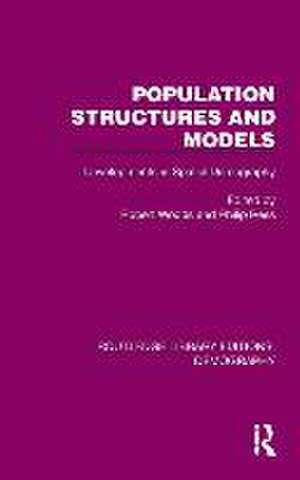Population Structures and Models: Developments in Spatial Demography: Routledge Library Editions: Demography
Editat de Robert Woods, Philip Reesen Limba Engleză Hardback – 2 oct 2023
Din seria Routledge Library Editions: Demography
- 37%
 Preț: 487.52 lei
Preț: 487.52 lei - 29%
 Preț: 486.69 lei
Preț: 486.69 lei - 37%
 Preț: 489.12 lei
Preț: 489.12 lei - 36%
 Preț: 495.44 lei
Preț: 495.44 lei - 36%
 Preț: 497.81 lei
Preț: 497.81 lei - 37%
 Preț: 488.62 lei
Preț: 488.62 lei - 37%
 Preț: 488.02 lei
Preț: 488.02 lei - 37%
 Preț: 488.79 lei
Preț: 488.79 lei - 31%
 Preț: 686.61 lei
Preț: 686.61 lei - 30%
 Preț: 425.74 lei
Preț: 425.74 lei - 37%
 Preț: 489.38 lei
Preț: 489.38 lei - 37%
 Preț: 489.12 lei
Preț: 489.12 lei - 37%
 Preț: 491.98 lei
Preț: 491.98 lei - 37%
 Preț: 493.17 lei
Preț: 493.17 lei - 37%
 Preț: 487.17 lei
Preț: 487.17 lei - 33%
 Preț: 7123.26 lei
Preț: 7123.26 lei
Preț: 495.77 lei
Preț vechi: 778.84 lei
-36% Nou
Puncte Express: 744
Preț estimativ în valută:
94.87€ • 101.44$ • 79.10£
94.87€ • 101.44$ • 79.10£
Carte tipărită la comandă
Livrare economică 17 aprilie-01 mai
Preluare comenzi: 021 569.72.76
Specificații
ISBN-13: 9781032553597
ISBN-10: 1032553596
Pagini: 460
Dimensiuni: 156 x 234 mm
Greutate: 1.01 kg
Ediția:1
Editura: Taylor & Francis
Colecția Routledge
Seria Routledge Library Editions: Demography
Locul publicării:Oxford, United Kingdom
ISBN-10: 1032553596
Pagini: 460
Dimensiuni: 156 x 234 mm
Greutate: 1.01 kg
Ediția:1
Editura: Taylor & Francis
Colecția Routledge
Seria Routledge Library Editions: Demography
Locul publicării:Oxford, United Kingdom
Public țintă
Postgraduate, Undergraduate, and Undergraduate AdvancedCuprins
1.Spatial Demography: Themes, Issues and Progress Robert Woods and Philip Rees Part 1: Spatial Variations in Demographic Structures 2. Spatial and Temporal Patterns Robert Woods 3. The Spatial Dynamics of the Demographic Transition in the West Robert Woods 4. The Analysis of Regional Fertility Patterns John Coward 5. Rising Fertility in Developing Countries Tim Dyson and Mike Murphy Part 2: Modelling and Forecasting 6. Developments in the Modelling of Spatial Populations Philip Rees 7. Choices in the Construction of Regional Population Projections Philip Rees 8. The Analysis and Projection of Interregional Migration in the United Kingdom John Stillwell 9. Forecasting Place-to-Place Migration with Generalized Linear Models Frans Willekens and Nazli Baydar 10. Demographic Processes and Household Dynamics: A Microsimulation Approach Martin Clarke 11. A Demographic-Economic Model of a Metropolis Moss Madden and Peter Batey Part 3: Reconstruction, Estimation and Evaluation of Demographic Patterns 12. Demographic Estimation: Problems, Methods and Examples Philip Rees and Robert Woods 13. Regional Population Analysis in Developing Countries: The Creation of a Database for Thailand Wim Doeve 14. Assessing the United Nations Urbanization Projections for the Asian Pacific Jacques Ledent and Andrei Rogers.
Recenzii
Review of the original edition of Population Structures and Models:
‘…readers should find the text well-organized and coherent, formula notations clearly defined and tables and figures quite helpful in reinforcing an understanding of the subject.’ John F. Watkins, Professional Geographer, Vol 40, Issue 2.
‘…readers should find the text well-organized and coherent, formula notations clearly defined and tables and figures quite helpful in reinforcing an understanding of the subject.’ John F. Watkins, Professional Geographer, Vol 40, Issue 2.
Notă biografică
Robert (Bob) Woods was one of the most eminent historical demographers of his generation. He held the John Rankin Chair of Geography at the University of Liverpool, served as President of the British Society for Population Studies (1991), was founding co-editor (1997-92) of the International Journal of Population Geography and was a recipient of the Society’s Murchison Award (1999).Philip Rees, now an emeritus professor, has spent over half a century at the University of Leeds researching spatial population dynamics, mentoring generations of students, leading programmes for improving access to UK population data, participating in international collaborations and advising government and business. His key contribution, illustrated in the book, has been to show how spatial demographic models, especially those for projecting populations, must be founded on the proper understanding of how migration is measured."
Descriere
Originally published in 1986, this volume brings together geographical modelling of population change and demographic analysis of population structures and pattern.
